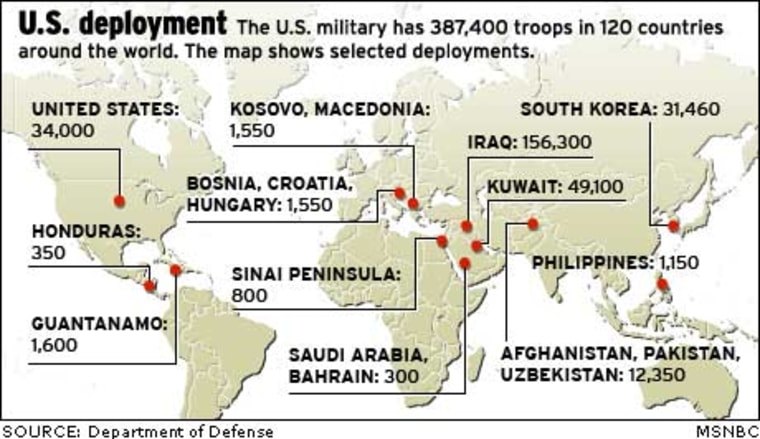The Pentagon has advised Germany that as part of a global shifting of U.S. military forces, it wants to withdraw its two Army divisions and replace them with fewer, lighter, more mobile troops.
The move would represent a significant change in the U.S. military presence in Europe, where American forces stood guard throughout the Cold War against the threat of a land invasion from the Soviet Union. The Pentagon has no intention of abandoning Europe but wants more flexibility in the way it can move Germany-based forces into other parts of the world like the Middle East, U.S. officials have said.
Defense Undersecretary Douglas J. Feith briefed senior German defense and diplomatic officials last week in Germany on the Pentagon thinking about U.S. troops in Germany.
Feith stressed in an interview with The Associated Press on Tuesday that there’s been no decision on U.S. troops in Germany. He said, however, that planning was “very far along,” and “we are going to share our analysis” with the Germans.
A senior administration official, who spoke on condition of anonymity, said the near-final Pentagon thinking on the matter was to withdraw the two American divisions.
Pentagon calls it ‘swapping’ of forces
Feith said the Pentagon was “pushing forward with cutting-edge capabilities” and that fewer, lighter and more modern units would be moved into Germany.
“It is not a retreat,” Feith said. “We are swapping some forces for others.”
In the revamping, Feith, who is undersecretary of defense for policy, said the 5th Corps headquarters, which is in Germany and oversees nearly all U.S. Army troops in Europe, would be overhauled but remain a headquarters.
The two divisions in Germany are the 1st Armored and the 1st Infantry. They would be returned to the United States under the Pentagon plan although it was unclear where.

In Berlin last week, Germany and U.S. officials had insisted that the United States had yet to complete plans for any troop withdrawals from Germany and was still consulting with allies.
German Foreign Ministry spokesman Walter Lindner told reporters Friday that it was too early to publicly discuss timetables and numbers.
Some 70,000 U.S. troops are assigned to Germany, although the Army’s 1st Infantry Division and 1st Armored Division are currently in Iraq. The 1st Armored is due to finish its Iraq tour within a few weeks.
Retrenching to Turkey?
U.S. troops were based in large numbers in Germany throughout the Cold War to deter a Soviet invasion.
Turkey, close to Iraq and other hot spots in the Middle East, has been cited as a place to which some forces — particularly fighter planes — could be moved.
In South Korea, meanwhile, the U.S. military command announced Monday that it planned to cut U.S. troop strength — currently at 37,000 — by 12,500. But South Korean Defense Minister Cho Young-kil said Tuesday that talks with U.S. officials about the reduction were not complete.
The Bush administration is carrying out a worldwide force realignment to respond more effectively to emerging threats.
At the same time, it is trying to cope with keeping 138,000 U.S. troops in Iraq to help the newly sovereign government in Baghdad gain control over opposition forces. The United States also has some 20,000 troops in Afghanistan.
Rationale is modernization
Even so, the worldwide revamping is being cast in terms of modernizing for the new century, and not offsetting manpower needs in Iraq and Afghanistan.
There are now about 40,000 U.S. Army troops in Germany. But Feith said with plans to send “lighter forces in,” it was not clear what the net reduction might turn out to be.
“Everything we are talking about now is in a sense notional because no final decisions have been made,” Feith said.
“I stressed to them that what we are doing here is increasing our capability to fulfill (NATO) alliance commitments well into the future,” Feith said. “They understood if you don’t modernize and update your capability, you wind up with a problem.”
The Germans understand “that what counts is capability, not numbers,” he said.
Germany’s consent would be necessary for the Bush administration to make a decision, he said.
And if the plan is approved, there will be further consultations with Germany in future years on how forces are aligned, Feith said.